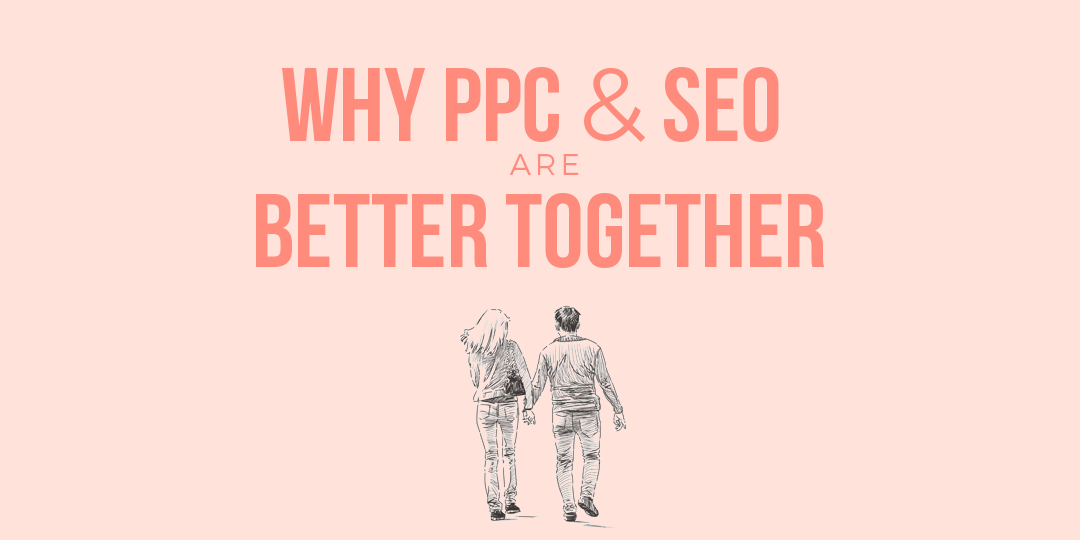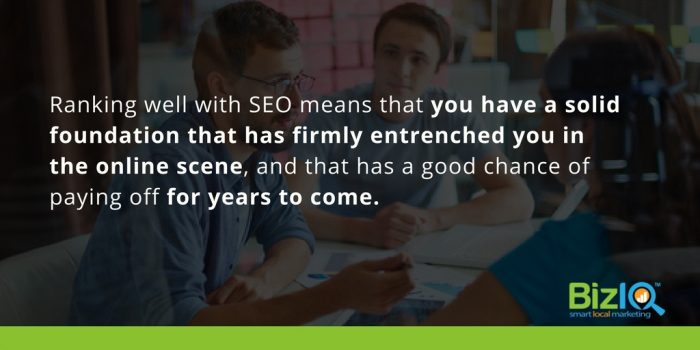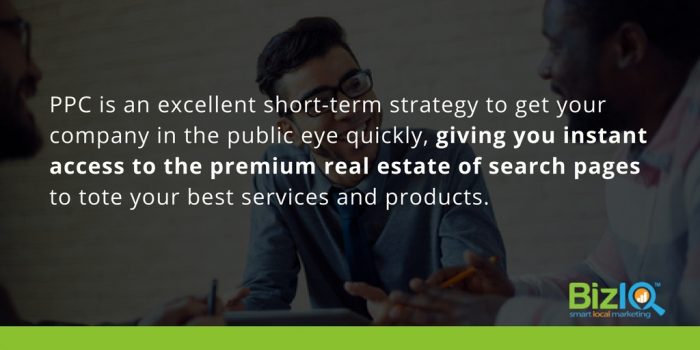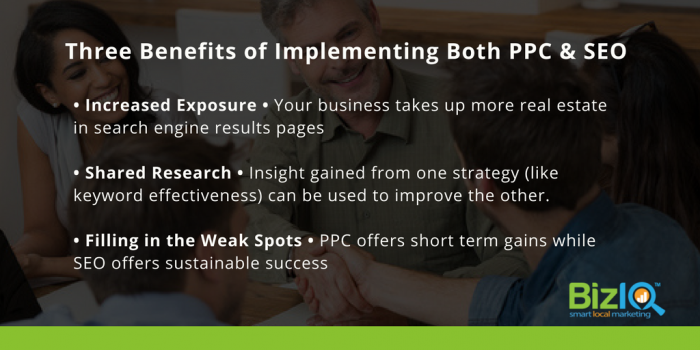Online marketing is a system in which there is arguably no such thing as overkill. Certainly, there is more than enough room for discussion and disagreement on what type of strategy is ideal: Which will give you the biggest returns for the least amount of money? Which is better in the short term? What about the long term? Where does the balance between efficiency and effectiveness fall?

As with debates over what constitutes the best in desserts (strawberry pie), weight loss methods (not jogging), or music (anything inspired by 80s pop, or maybe Hamilton), there isn’t necessarily a definitive answer to these questions. What is going to work best for you as a small business owner is going to depend on what your company’s particular needs are. Are you a physical or on-site location? What sort of customer traffic do you most want to see an increase in? And what kind of budget are you willing to work with?
If there is any go-to technique to doing digital advertising right, it comes with the general maxim that tends to work well in many situations: do it all.
The goal of this article is to lay out an opening case for why combining the Big Two of marketing in the Internet age — SEO and PPC — is the ideal for any business owner looking to see a jump in their online traffic. Don’t let arguments advocating one over the other persuade you into thinking that this is a case of choosing sides; there is no reason why they can’t perform hand-in-hand in a manner that is much greater than the sum of its parts.
You may as well make the most of all of the tools at your disposal, right?
The Merits of One or the Other
Before we get into the specifics of what makes for such a perfect union, let’s take a moment to refresh ourselves on the differences between SEO and PPC

Search Engine Optimization (SEO)
SEO is a marketing strategy most focused on playing the long game. Its goal is to ensure that your business appears as high as is possible in search engine lists that are generated organically — these are the ‘normal’ results that appear below the ads and maps that take up the top of a Google page.
SEO is an approach that pays off in the long run. Your ‘natural’ ranking on a page of results is determined by a great many factors: the consistency of your information across multiple sources, the amount of detail included in that information, reviews, the length of time that it has been up online, the traffic that these sources generate, and more. No matter how on-point your management of this material is, it’s going to take time for it to take hold and grow to the point where you’re able to nab that coveted first-page (if not top-spot) podium.
Think of it as the reward for building your brand from the base-up. Ranking well with SEO means that you have a solid foundation that has firmly entrenched you in the online scene, and that has a good chance of paying off for years to come. As mentioned already, though, you’ll be in for a wait before you see returns.
Pay-per-click (PPC)
PPC, in contrast, is a much more immediate solution to getting your name out. It lets you ‘buy’ visits to your content via ads — the ones that you see at the very top of a search results page before anything else. Businesses will bid on which keywords that they want their ads to appear with when searched and then pay that amount every time their ad is clicked on.
PPC is an excellent short-term strategy to get your company in the public eye quickly, giving you instant access to the premium real estate of search pages to tote your best services and products. If nothing else, one more ad for you is one less ad for a competitor. Extensions will let you choose what information you deem most important to include, and can incorporate useful features for mobile users like direct links to map directions and contact information.
It’s a cost-effective method that can get you quick increases in traffic, but only if done correctly. Promotions, after all, won’t do much if nobody is actually persuaded by them. Advertising is a complicated realm to navigate. What is going to net you the most clicks, and how can you determine that ideal?
The Ideal of Cooperation
While both SEO and PPC boast a fair share of strengths individually, a combination of the two can make for a mutually beneficial relationship in which each can shine while compensating for the other’s weaknesses. Let’s break it down a bit:
More Exposure
If nothing else, such a partnership need not even be so symbiotic in order to be successful: at the end of the day, having both working for you means that you’re getting twice the amount of marketing. And this is one arena in which more is, in fact, always better.
If you’re able to have your business appear repeatedly at the top of that first page of results — in both the advertisements and the organic results further down — searchers are being exposed to your business multiple times in short order. That repetition is going to leave a stronger impression on potential customers and suggest an inherent reliability in your brand.
This can also be a blessing when attempting damage control. Every business is likely going to have to recover from some kind of bad publicity eventually, and having your marketing at its peak is going to better let you tell your side of the story and make amends. By bidding on keywords related to the negative press, PPC can ensure that your rectifying efforts will be featured, while your SEO content can better present the details once readers are hooked.
Shared Research
Twice the amount of marketing means twice the amount of usable information. Generally, SEO and PPC advertising share similar strengths. What works for one is likely going to work well for the other, and so insight gained from either will be useful in fine-tuning your strategy for its partner. And when the data from both is taken as a whole, you’re left with a great deal more input to develop future campaigns from.
PPC will give you immediate feedback on what keywords are or are not working, which can then be used to develop SEO content by plugging in (or removing) those same terms and phrases from descriptions, website pages, tags, and beyond. Conversely, words that appear to be working well in SEO can be used to tweak PPC to ensure you’re getting as many clicks as you can.

Filling in the Weak Spots
Let’s look at that last paragraph a big closer. With a combination of SEO and PPC, businesses can avoid both the immediate and future issues that come with relying only on one.
SEO, for instance, is reliable in the long run, but only if it has been optimized, and it can be difficult to determine what is and isn’t effective without waiting. Seeing results is a gradual process, and this is where PPC shines: how well a particular word or detail works can be determined quickly. If it’s a winner, you can use it as a template for developing title tags, meta descriptions, and page content for your SEO material. If it’s a dud, you’ll know to abandon one method and try something new, with a minimal loss to you time and money.
Seeing a spike in clicks from a particular word or an ad more prominently featuring one element of your company over another? Be sure to sprinkle the term around your site more frequently, or give that information a more prominent spot. This can also be used to try out website designs: if one advertisement’s linked page generates more follow-up traffic from a certain layout than another, you know it could be worthwhile to rework your look.
On the other end of this is PPC, which is good for quick, but ultimately superficial, fixes in addition to its prowess as a market tester. Should you find a hole in your campaign — you aren’t ranking well for a particular keyword, for instance — PPC can be brought in to immediately give you a presence in those searches. Unless your budget is high enough, however, there’s a good chance you won’t be able to pay for every possible search term, and SEO can help minimize this. In addition, operating only by ads is not going to be reliable in nabbing actual conversions from clicks: you need actual material behind them to back up your pitch. You need to ensure that customers are actually being persuaded to employ your services, not simply taking a cursory glance at your material.

Genuine Results
In online marketing, success is a cutthroat arena with a narrow margin for success. The vast majority of Google searchers will not even bother scrolling down the page to see beyond the first three or four organic results, much less go to the second (or, heaven forbid, third) page. When it comes to nabbing potential customers, your first impression — if you even manage to get one in at all — is the only chance you get at their business.
This idea isn’t one that we simply espouse because it sounds like a good one. Here at BizIQ, we’ve seen genuine improvements in our customers’ rankings thanks to the combined use of SEO and PPC; in some cases, up to a 92% increase in keyword clicks, a 200% increase in conversion rates, and a 27% increase in profits.
Both strategies can provide too little return for too much money, but only if you aren’t smart about their management. With proper planning and use of data, the combination of SEO and PPC can be both fast acting and long lasting, and using a tailor-made approach doesn’t have to break the bank. Don’t be afraid to expand your toolkit! If you know what you’re doing, there’s no reason why being a jack-of-all-trades in the realm of digital marketing has to be a bad thing.

